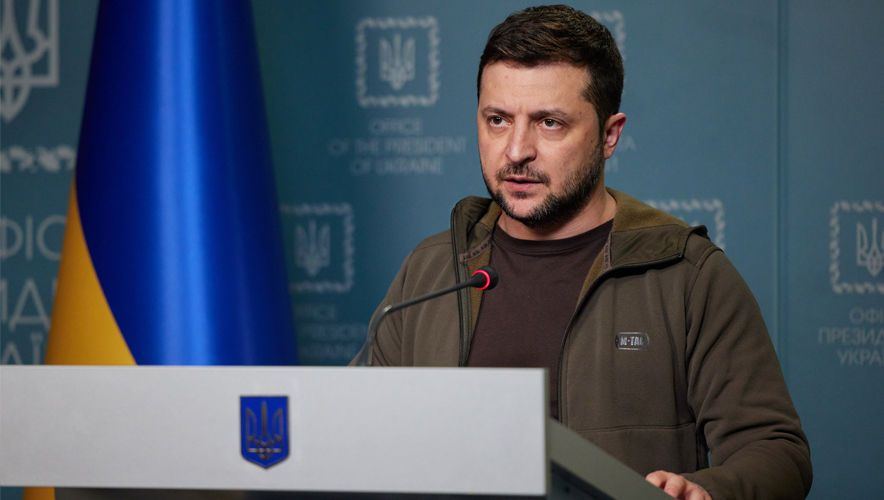As Zelensky Makes Plea to U.N., International Bodies Open War Crimes Investigations in Ukraine
As authorities uncover the extent of the atrocities and devastation in Bucha—a suburb outside Kyiv—and other sites throughout Ukraine, there is growing international outrage and calls for charges of war crimes to be levied against Russia.
Ukrainian President Volodymyr Zelensky addressed the United Nations Security Council on 5 April after the retreat of Russian forces revealed scenes of brutality, mass killings, and destruction.
Ukrainian President Zelensky describes graphic scene in Bucha, Ukraine to the @UN Security Council. pic.twitter.com/VKjp2VplMi
— CSPAN (@cspan) April 5, 2022
Russian action “undermines the whole architecture of global security,” Zelensky told the body. “They are destroying everything.” He demanded that the Security Council hold Russian leaders and forces accountable for “most terrible war crimes.”
Images from Bucha show bodies on streets with their hands bound, and a mass grave was discovered. The Wall Street Journal reported the Ukraine prosecutor general said 410 killed civilians had been found in areas surrounding Kyiv. The organization Human Rights Watch documented eyewitness accounts of Russian forces summarily executing individuals, raping, and looting.
In remarks on 4 April, U.S. President Joe Biden said, “You may remember, I got criticized for calling Putin a war criminal. Well, the truth of the matter—you saw what happened in Bucha… he is a war criminal.”
The images of lifeless bodies, bloodied by bullets, left behind in Bucha, Ukraine, after Russia’s withdrawal have provoked international outrage.
— The New York Times (@nytimes) April 5, 2022
The photographs and eyewitness accounts could provide documentation for potential war crimes investigations.https://t.co/fpICkUYTdB
The recent revelations have added credence to several war crimes investigations that are already underway. From the Associated Press:
“The U.S. and more than 40 other countries are working together to investigate possible violations and abuses, after the passage of a resolution by the United Nations Human Rights Council to establish a commission of inquiry. There is another probe by the International Criminal Court, an independent body based in the Netherlands. The U.S. Senate unanimously approved a resolution last month seeking investigations of Putin and elements of his government for war crimes over the invasion of Ukraine.”
The term “war crimes” has a specific meaning and a specific context. It’s meaning is established in the 1949 Geneva Conventions and Additional Protocols and the Rome Statute of the International Criminal Court. Terminology in these documents is relatively vague. The Geneva Conventions outlaw “wilful killing” and “extensive destruction and appropriation of property, not justified by military necessity and carried out unlawfully and wantonly.” The Rome Statute outlaws “intentionally directing attacks against civilian objects” and “intentionally directing attacks against the civilian population.”
The context is that the outlawed actions must be provable at a trial, which is where the investigations come into play. According to experts quoted in one commentary in The Washington Post, prosecuting war crimes means proving intent behind actions, which is a difficult standard:
“Social media documentation can help in investigations. But the bar for evidence in war crimes cases is high, international law experts say.
“War is a bloody business, and civilian casualties are expected. In many cases, proving that the killing of civilians constitutes a war crime requires showing the attacker’s intent to harm civilians or strike forbidden targets such as hospitals and schools. So holding top officials accountable typically requires intercepting communications up the chain of command, Gow said.
“‘Proportionality’ is a subjective standard that isn’t clearly defined, [William Schabas, a professor of international law at Middlesex University in London,] said—and Ukraine’s defense tactics, including the fortification of residential neighborhoods in Kyiv, give Russia legal cover for attacking civilian areas.”
Another complication the article described is the extent to which Ukrainian civilians have joined the fight against the Russian forces with aggressive tactics such as Molotov cocktails or ambush attacks. Such actions would strip the protections afforded to civilians under international law.
The Council of Foreign Relations examined the publicly known evidence in Ukraine in the framework of war crimes, detailing how the evidence would fit under violations of war crimes.
Additional context in any war crimes scenario is the notion of holding Russian leaders accountable. Russia, like the United States and China, does not recognize the authority of the International Criminal Court. The Council of Foreign Relations article said continued or new sanctions could be used to pressure the surrender of those accused of war crimes, but such an outcome could prove difficult.
“Even if the evidence is there, putting Russian officials—let alone Putin—on trial is unlikely, barring major political change in Russia,” The Washington Post commentary reported. “As long as the Russian government remains unwilling to cooperate, and Russians accused of crimes don’t travel abroad, there’s not much international prosecutors can do.”
Most of the world has lined up against Russia’s invasion of Ukraine, and national representatives on the Security Council took turns praising the bravery of Zelensky and the Ukrainian people and condemning Russia’s actions.
For his part, the Russian member vehemently denied any accusations of Russian atrocities and described brutalities Russia accuses Ukraine of committing, and rehashing at some length the claims that Ukrainian leaders are in fact Nazis.
However, Russia is not entirely alone in the international community. Pro-Russia and pro-Putin leaders remained in power after elections in Hungary and Serbia, although the Organization for Security and Cooperation in Europe said the elections were undertaken on “an uneven playing field.”
In addition, and more importantly, China continues to hold out. While publicly calling for peace, they noticeably do not condemn the actions of Russia.
